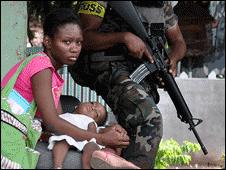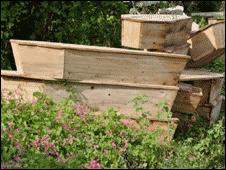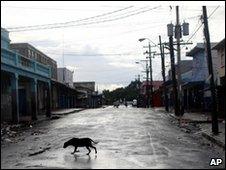Scared and hungry in Jamaica's Tivoli Gardens
- Published

Soldiers are posted on the streets and roofs of buildings in the area
The drive into Kingston's Tivoli Gardens was surreal.
We rode on buses laid on by Jamaica's tourism ministry, emblazoned with the cheerily familiar phrase "have a nice day".
But our guides were stern-faced, heavily armed soldiers. We were told the bus would pull up, and that the assembled pack of international journalists would then be taken on a brief walking tour of a neighbourhood debilitated by urban warfare.
First observation: there were very few men in Tivoli Gardens. Police and soldiers had rounded up hundreds of suspects - leaving women, children and elderly residents to greet us.
Many seemed unnerved by the nearby soldiers, even hiding their faces from the cameras. But others were keen to talk.
Burnt-out cars
Maxine Davis pointed out the bullet holes in her modest, bright orange-coloured house. The front yard had clearly become a major front in the fighting, so I asked whether anyone had been arrested here.

Coffins are piled up alongside corpses in the cemetery
"Not at all," she replied, "just Mum and Dad live here - and they're elderly."
The neighbourhood was littered with what remains of the improvised barricades that were erected to keep back the soldiers. Burnt-out cars, gas canisters, barbed wire and pieces of twisted, rusty metal lined the road surface.
Soldiers stood on every street corner, and looked out from the roofs of multi-storey buildings.
One woman complained of a shortage of food and water in the days since Tivoli Gardens exploded. But in truth, this looked like a poor and troubled community at the best of times.
Where, for decades, the state was practically non-existent and where Jamaica's most wanted man, Christopher Coke, gladly filled the void - doling out largesse in return for loyalty.
Between Mr Coke and the security forces, it was clear who residents feared most. A crowd of angry young women said the men in uniform had fired indiscriminately upon local people with no connection to drugs or guns.
"The police were the ones doing the killing," exclaimed one. "They killed people and then burned them up there."

Police and soldiers have rounded up hundreds of suspects in Tivoli Gardens
She gestured in the direction of Maypen cemetery, which borders Tivoli Gardens. Before the tour, we had visited the site and found a pile of coffins, alongside other corpses exposed to the elements.
We witnessed the comings and goings of police vehicles from the site. But the authorities insist they have been truthful about the number of dead, and that no bodies were burned.
Back in Tivoli Gardens I spoke to Major Ricardo Blackwood of the Jamaica Defence Force, who had politely but firmly ushered us through the various stages of our tour.
"The situation is getting back to being normal," he explained. "In the areas we've gone to, people are still being allowed to carry out their normal daily activities."
But he added that other parts of the neighbourhood were still being secured, and were therefore too volatile for the media to visit.
And what, I asked, of the alleged narcotics kingpin whose extradition warrant to the United States triggered the violence? Did Maj Blackwood really believe Mr Coke was still here?
"I'm not too sure," came the understated reply. "The ground commanders have to do the business of searching and finding him."
- Published26 May 2010
- Published26 May 2010
- Published25 May 2010
- Published1 September 2011